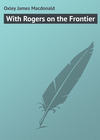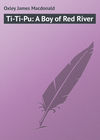Buch lesen: «With Rogers on the Frontier», Seite 9
CHAPTER XVII
THE SIEGE OF FORT WILLIAM HENRY
The failure of Rigaud's expedition against Fort William Henry was followed by a period of peace, during which Seth was occupied for the most part in leading scouting parties northward to spy upon the doings of the French at Ticonderoga and Crown Point.
He had many an adventure in this service, and more than once escaped capture by what was almost a miracle, yet his ardor was not in the least damped by any of these thrilling experiences, and he had no sooner got safely back from one outing than he began to plan for another.
Major Rogers meanwhile had been despatched to Nova Scotia on a special mission, and consequently was far away when the French resolved to wipe out the disgrace of the defeats of Dieskau and Rigaud by sending such a force against the obstinate defenders of the English fort as would render complete victory an absolute certainty.
To this undertaking Montcalm himself gave his personal attention, and got together at Montreal an army of regulars, Canadians, and Indians that, so far as numbers went, certainly seemed to assure success.
By the end of July he had all transported to Ticonderoga, where Bourlamaque, with the battalion of Bearn and Royal Rousillon had been since May, finishing the fort and sending out scouting parties to discover the strength and designs of the English at Fort William Henry.
Ticonderoga, which by being made the base of the projected attack upon the English stronghold had become a point of great importance, is a high rocky promontory between Lake Champlain on the north and the mouth of the outlet of Lake George on the south. Near its extremity and close to the fort were encamped the battalions of Bourlamaque.
Two miles farther south a wide space had been cleared which was covered by the tents of the regiments of La Reine, Languedoc, and Guienne, all commanded by Levis.
From this camp a road a mile and a half long had been cut through the forest to the navigable waters, and at the end of this road was another fortified camp formed of colony regulars, Canadians, and Indians, under command of Rigaud.
Beyond this at the edge of Lake George, and at Rogers' Rock, were stationed advance parties whose business it was to watch the movements of the English.
There were thus gathered within a range of four miles fully eight thousand fighting men, representing the brightest civilization and the darkest barbarism of the day, from the scholarly Montcalm and the accomplished Levis with their suite of courtly young officers, to the foulest man-eating savages of the uttermost northwest.
The Indian allies numbered nearly two thousand. They were exceedingly difficult to manage and cost their employers infinite trouble, besides being a tremendous expense. There was no keeping them fed. Rations would be served to them for a week, and they would consume them in a couple of days and demand more. Once when refused they took the matter into their own hands, and butchered and devoured a drove of cattle intended for the troops.
Their supreme delight was to get drunk; and sometimes when crazed with brandy they fought like wolves, grappling and tearing each other with their teeth.
Some of them were cannibals, and actually dared to indulge in their abominable appetite while in camp, the unfortunate victim being an English prisoner taken by one of their war parties.
Such were the fiends in human form whose aid the French had enlisted, and who subsequently were to cast so dark a stain upon the record of this enterprise.
It was the 1st of August when, having got everything arranged to his satisfaction, Montcalm set his whole force in motion toward the object of his undertaking. The spectacle presented was a brilliant and imposing one, and well calculated to strike terror into the hearts of those against whom it was prepared.
Seth and a little band of his Rangers, who had ventured out from Fort William Henry on a scouting expedition, beheld it from the summit of a lofty hill, and their spirits sank at the sight.
"Heaven help us! There's no counting them!" exclaimed Seth in a tone of consternation. "We can't possibly hold the fort against them. They've five times as many men as we have, at least."
"Let us hurry back to the fort then and tell Colonel Monro," Reuben Thayer made haste to suggest. "Perhaps he'll think it best not to attempt to defend our fort, but to retreat to Fort Edward."
"We can't tell him too soon what we've seen," returned Seth. "But I'm sure he won't give up the fort without a fight. He's too brave to do that."
In this opinion of Lieutenant-Colonel Monro, who then was in command at Fort William, Seth showed how well he knew the man, for the sturdy Scotch veteran certainly was not of the kind to beat a retreat or to surrender at discretion. On the contrary, he could be relied upon to fight to the very last; and, if need be, to die rather than give up his sword.
What the Rangers saw was the French flotilla moving up the lake in the full blaze of the afternoon sun.
First a great swarm of birch canoes crowded with naked savages in war paint and feathers, and gliding swiftly over the smooth water in no particular order. Next came two hundred and fifty bateaux, moved by sail and oar, some bearing the Canadian militia and some the battalion of old France in handsome uniform. Then followed the cannon and mortars, each one placed on a platform, sustained by two bateaux lashed side by side, and rowed by the militia of Saint Ours. The battalions of Bearn and Rousillon, the Canadians of Gaspe with the provision boats and the field hospital continued the procession, and lastly a rear-guard of regulars closed the long line.
No wonder that while the watching scouts could not help being filled with admiration at the spectacle, they also were depressed by the conviction that to repel the attack of such a force was hopeless, and that the fate of their beloved fort was sealed.
With utmost speed they made their way back through the woods, and told Commander Monro what they had seen.
As Seth rightly judged, the brave old man, while fully realizing the seriousness of the situation, did not for a moment contemplate the evacuation of the fort, or the anticipating of the attack by sending a message of surrender to Montcalm.
What he did do was at once to despatch a note to General Webb, who was at Fort Edward, fourteen miles distant, with nearly two thousand men, informing him of the advance of the French and asking for reinforcements, a request which he repeated again and again during the siege, without evoking any response from Webb, who seemed to have been too timid to do as he should have done, namely, hasten forward with his troops to the support of his imperilled brethren in arms.
All told, including sailors and mechanics, Monro had a bare two thousand men wherewith to oppose the eight thousand of the French commander. Yet when Montcalm, having arrived within striking distance of the fort, and completed his preparations for the siege, sent an aide-de-camp to him with the following letter:
"I owe it to humanity to summon you to surrender. At present I can restrain the savages, as I might not have power to do under other circumstances, and an obstinate defence on your part can only retard the capture of the place a few days, and endanger an unfortunate garrison which cannot be relieved. I demand a decisive answer in an hour;" the doughty Scotchman gave his answer at once, and it was that he and his soldiers would defend themselves to the last, emphasizing his refusal by a broadside from his cannon so soon as the truce was ended.
While the white flags were flying the Indians swarmed over the fields before the fort; and when they learned the result of the parley, an Abenakis chief shouted exultantly in broken French:
"You won't surrender, eh! Fire away then, and fight your best, for if I catch you, you shall get no quarter" – a threat that was only too awfully fulfilled in the sequel.
At this time Fort William Henry was an irregular bastioned square, formed by embankments of gravel, surmounted by a rampart of heavy logs laid in tiers crossed one upon another, the interstices being filled with earth. The lake protected it on the north, the marsh on the east, and ditches with chevaux-de-frise on the south and west. Seventeen cannons, great and small, besides mortars and swivels were mounted upon the ramparts.
Montcalm's first proceeding was to open trenches for the protection of his soldiers – a task of extreme difficulty, as the ground was covered with half burned stumps, roots, and fallen trunks. All night of the 4th of August eight hundred men toiled with pick and spade and axe, while the cannon from the fort flashed through the darkness, and grape and round shot whistled and screamed over their heads.
Before daybreak the first parallel was completed, and a battery nearly finished on the left, while another was well started on the right. The men now worked under cover, safe in their burrows, one gang relieving another, as the operations went steadily on all day.
So soon as these forts were in readiness, Montcalm mounted his cannon upon them, eight at the left and eleven at the right, and proceeded to bombard Fort William Henry vigorously. The fort replied with spirit, and for several days ensuing the heavy guns thundered from dawn until dark, while from a hundred peaks and crags the astonished wilderness roared back the sound.
The Indians enjoyed this artillery performance greatly. They had been of no use whatever thus far, as instead of devoting themselves to scouting, they loitered about the camp and trenches, or amused themselves by firing at the fort from behind stumps and logs.
Some, in imitation of the French, dug little trenches for themselves in which they wormed their way toward the ramparts, and now and then picked off an artilleryman, although not without loss on their own side.
Seth, whose heart was hot against the redskins, not only because they were of the enemy, but because of what he had himself suffered at their merciless hands, made a point of watching for them; and not a day passed without his having the satisfaction of putting an end to the career of one or more of them.
By the end of the week the French had pushed their trenches so far forward that a battery was begun not two hundred and fifty yards from the fort, and the Indians lay so thick among the beans, maize, and cabbages that none of the garrison dared show themselves for an instant, as that meant certain death.
The position of the besieged had now become deplorable. More than three hundred of them had been either killed or wounded; the dread disease of smallpox was raging in their midst and the casemates were crowded with the sick. All the large cannon were burst or dismounted, the ramparts were already breached in several places, and a general assault might be looked for at any time, while there was evidently no hope of assistance from Fort Edward where General Webb still stayed inert.
After consultation with his officers Monro determined upon attempting a sortie in force, and among those selected to share in it were the Rangers, the majority of whom had so far escaped both shot and sickness.
"We have about reached the end of our tether," the sturdy old Scotchman said sadly to the council. "A sortie seems to be the only thing left for us to try. I confess I am not at all sanguine myself of it doing us any good, but there's no telling. It may gain us some respite even though it does not effect our deliverance."
There was no dissenting voice, but on the contrary a hearty support of the veteran's project; and when volunteers for the forlorn hope were invited by him, not one of the officers held back.
Seth felt highly gratified when to the Rangers was assigned the perilous honor of taking the lead.
"There is only one chance in ten of our getting back alive, Reuben," he said to his friend, as, with countenance whose gravity showed how fully they realized what was before them, they talked together after the council of officers had dispersed, "but we can only do our best. If we have to surrender, I pray God we may not fall into the hands of those red devils the French have with them. I'd rather be shot at once than be taken prisoner by them and tortured to death."
"And so would I," answered Reuben. "They're perfect fiends, not human beings, and the French ought to be ashamed of themselves for having such allies."
It was at the dead of night when the majority of the effective men in the garrison silently moved out of the fort and across the fields in the direction of Montcalm's encampment.
They were favored in their enterprise by the intense darkness of the night, and by the fact that the bombardment had been so heavy all day that the French were persuaded they had practically cannonaded their antagonists into helplessness, and consequently took no special precautions against a night attack.
Led by the Rangers, who seemed to possess the faculty of seeing in the dark, the gallant band made its way resolutely toward the enemy's position, and had got so near that they could hear the sentries exchanging the watchword on their rounds, when the challenge "Qui va la?" rang sharply out on the still night air, and they came to a sudden halt.
CHAPTER XVIII
THE MASSACRE OF THE ENGLISH
Seth was so close to the sentry who had discovered their approach, that with a single bound forward he was able to cut him down and silence him forever.
But his warning challenge had been heard by others of the guard, and they hurried out to investigate. Realizing that further concealment of their design was not possible, Colonel Frye, who was in command, called upon his men to fire, and they poured a volley into the French encampment that wakened every sleeper, and for the moment created lively confusion.
The well-disciplined soldiers soon regained order, however, and rushed to repel the attack in such numbers that Colonel Frye at once saw the hopelessness of withstanding them, and gave the command to retreat.
Reluctantly enough his men obeyed, for, although they could see for themselves how they were outnumbered, they did want to inflict some loss upon the enemy before retreating to the fort.
They accordingly gave back as slowly as possible, firing and reloading their muskets with such celerity that the French conceived their numbers to be much greater than they really were, and were more cautious in their pursuit than they would have been if they had known the truth.
Seth was one of the last to retreat, and his slowness nearly cost him his life, as an Iroquois scout, creeping serpent-like through the long grass, got near enough to hurl his tomahawk at him with deadly aim. But by a happy chance Seth at that moment threw up his gun, and the hatchet struck it instead of his head, glancing harmlessly off to one side.
In his rage at having missed, the Iroquois sprang upon Seth, and throwing his arms about him, strove to fasten his teeth in the Ranger's throat as though he were a wolf.
Now did Seth's skill in wrestling serve him in good stead. The redskin's onset was so sudden and unexpected that he had almost succeeded in his brutal purpose ere his intended victim could defend himself; but the next instant by a dexterous movement he evaded the cruel teeth, and then, dropping his gun, gripped his assailant around the neck, and flung him backward with such force that the savage's senses were knocked out of him, and he lay limp and harmless.
"It would serve you right if I put my knife into you," growled Seth, as he groped about for his gun. But he forebore to do it, and having picked up the gun, hurried after the others, who of course had not waited for him, and with them regained the protection of the fort.
The sortie having accomplished nothing, the situation seemed hopeless; and after again consulting with his subordinates, Colonel Monro with a heavy heart came to the conclusion that there was no alternative but to capitulate on the best terms obtainable.
Accordingly on the 9th of August a white flag was raised, a drum was beat, and Lieutenant-Colonel Young, mounted upon horseback, accompanied by a few soldiers, went to the tent of Montcalm.
As the result of his negotiations with the French commander it was agreed that the English troops should march out with the honors of war, and be escorted to Fort Edward by a detachment of French troops; all French prisoners captured in America since the war began should be given up within three months; and that all the stores, munitions, and artillery were to be the prize of the victors, with the exception of one field-piece which the garrison were to be permitted to retain in recognition of their brave defence.
These terms were fair and honorable to both parties; and if only Montcalm had taken such measures as would have insured their being carried out, the horrible proceedings of the following days, whereby what might otherwise have been considered a creditable achievement was turned into an appalling scandal, might have been prevented.
It is true that before signing the capitulation Montcalm held a council with the Indian chiefs and asked them to consent to the conditions and to promise to restrain their warriors from disorder, and that the chiefs approved of everything and promised everything.
But he should not have been content with this. Knowing the nature of his allies as he did, he ought to have used his regular troops upon whom he could depend as a guard for the English, who were in no position to defend themselves.
When the garrison evacuated Fort William Henry they marched over to join their comrades in the entrenched camp which was included in the surrender; and no sooner had they gone than a horde of yelling savages climbed through the enclosures in search of rum and plunder.
They found very little of either, and at once proceeded to vent their disappointment upon the unfortunate men, who, having been too sick to leave their beds, were awaiting removal later on.
These they butchered without remorse, and even cut off their heads, which they paraded proudly from the casements. It was a terrible scene, yet no attempt to check the fiends was made by the French, who seemed afraid to interfere with their savage allies.
Having looted the fort of what little there was in it, the Indians then turned their attention to the entrenched camp, where all the English were now collected. The French guard stationed there either could not or would not keep out the bloodthirsty rabble, and they roamed among the tents intrusive and insolent, their painted visages marked with sinister grins as they twitched the long hair of the terrified women in anticipation of the scalping knife.
Seth saw it all, and the witnessing of such indignities so filled him with fury that again and again he could scarce restrain himself from striking down one of the dusky demons. But of course any such act would have been utter folly, as it would certainly have precipitated the general massacre for which the Indians hankered.
At length through the earnest efforts of Montcalm and his officers something like order was obtained and the most of the Indians were persuaded to return to their own encampment for the night.
But there was little rest in the English camp, and as soon as day broke they made haste to set out for Fort Edward. They had their muskets, but they were without ammunition; and no sooner had they begun to move than the Indians, in spite of the presence of the French escort, began to plunder them of their little baggage, demanding rum, of which there was only a little in the soldiers' canteen.
When after much difficulty the column at last got started along the road, the redskins crowded in upon them, impeding their progress, snatching caps, coats, and weapons from the men, tomahawking those that resisted, and seizing upon women and children, dragged them shrieking away, or murdered them on the spot.
Suddenly arose the awful sound of the war-whoop, and at this signal for butchery the whole mob of savages rushed upon the rear of the columns where the New Hampshire men were, and proceeded to slaughter them wholesale.
A frightful tumult ensued. Montcalm, Levis, Bourlamaque, and other French officers who had hastened to the scene, threw themselves among the Indians, and by promises and threats sought to stop their murderous frenzy.
"Kill me, but spare the English who are under my protection!" exclaimed Montcalm in the dramatic fashion characteristic of his race, and he himself tore a young officer from the grasp of a Huron who was about to tomahawk him.
Yet the dreadful work went on until many hundreds of the unfortunate English had been either killed or carried off by the ruthless savages, before at last the survivors were got back to the entrenched camp, and there protected from further massacre by an adequate guard of French regulars.
Seth had a marvellous escape, or rather series of escapes. His chivalrous instinct had impelled him to keep near the women and children in the hope of in some manner being helpful to them; but, although he had possessed the strength of Samson, he could not have accomplished anything, for the Indians crowded in upon them from all sides, and it was impossible to ward off their assaults.
Yet he kept his place until at the raising of the war-whoop the general attack was made; and then in the wild confusion that followed he was jostled and hustled this way and that until he found himself separated from the main body and with the way clear to the forest.
"I can do nothing for the others," he muttered. "I may as well try and save myself." And after a quick glance to right and left to make sure there were no Indians near, he started to run for the shelter of the trees.
He had not gone many yards when the cry of a child fell on his ears. He checked himself for an instant, and looking in the direction from which the cry came, saw a little boy half hidden in the grass, who was calling to him:
"Take me with you, oh, take me with you too!"
At first Seth hesitated. Where delay probably meant death, to attempt to save the boy might merely imperil himself without benefiting the boy.
But the hesitation was only for an instant, and then, carried away by a generous impulse, Seth changed his course so as to take hold of the little fellow's hand, and together they fled toward the forest.
Half way thither they were met by an Indian who barred the way with a bloody tomahawk, and yelled at them in a frenzied fashion. He was a giant in size, and at sight of him the boy shrieked and cowered close to Seth, who came to a full stop as though he had no thought of resistance.
Misled by this apparent submission, the Indian, his eyes gleaming with the lust of blood, made a grab at the boy's hair with the intention of scalping him. Seth then saw his opportunity, and with a quick spring threw himself upon the wretch, who, not expecting this sudden onset, went down headlong, while the boy dodged out of his reach unhurt.
Holding him fast despite his violent struggles to get free, Seth tore the tomahawk from his grasp, and despatched him with the weapon already stained with the blood of his victims.
Then exclaiming: "One more devil done for!" he caught the boy by the hand, and resumed the race for the forest, which they reached, all spent but scathless.
Knowing his way thoroughly, he pushed on as rapidly as the strength of his little companion permitted, keeping a sharp lookout lest there should be any scouts hunting for fugitives.
By the end of an hour the poor boy was so exhausted that Seth had either to let him have a rest, or desert him. He of course chose the first alternative, and they hid in a hollow where no one could have found them save by coming right upon them.
The boy was full of gratitude to his preserver, and as the little chap curled up beside him, seeming to feel quite secure, Seth took some comfort from having been the means of saving his young life.
All that night and the following day they were in the woods with nothing to stay their hunger save the few berries they could find, but ere the return of night they reached Fort Edward, being the first of the fugitives to do so.
Seth's account of the atrocities perpetrated by the enemy filled those at Fort Edward with horror and indignation; and if the men had been left to themselves, they would have rushed to the scene to avenge their brethren.
But the saner councils of their officers prevailed. They were not in sufficient force to cope with the French and their allies, and, however daring and impetuous their attack might be, it could only result in their own discomfiture. There was nothing to be done but to keep within the fort until the invaders had finished their work of destruction.
During the days that followed cannon were fired at intervals from the fort to guide those who had fled to the woods, whence they came dropping in half dead with hunger; but it was not until more than a week after the surrender that the main body of the garrison appeared under the escort of a strong French guard.
Meanwhile the victors were busy demolishing the English stronghold. First the barracks were torn down, and then the huge pine logs of the ramparts were got together in a heap, upon which were thrown the bodies of the butchered men and women, and the whole was set on fire. "The mighty funereal pyre blazed all night. On the following day the army re-embarked for Canada. The din of ten thousand combatants, the rage, the terror, the agony were gone; and no living thing was left but the wolves that gathered from the mountains to feast upon the dead."
















